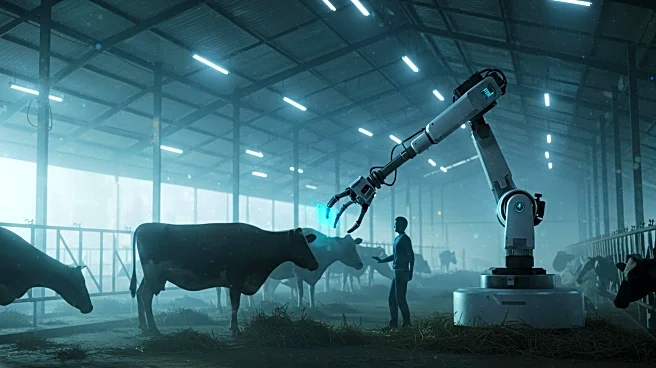What is the story about?
What's Happening?
Recent advancements in artificial intelligence (AI) and technology are significantly enhancing the monitoring and welfare of animals. These innovations include precision livestock technologies that generate large datasets for continuous monitoring of animal health and behavior. AI algorithms are being developed to analyze complex data for early disease detection and prediction, improving animal health outcomes. Technologies such as acoustic surveillance, advanced imaging, and olfactory monitoring using electronic noses are being integrated with AI to assess animal welfare and detect disease-specific volatile organic compounds. Additionally, wearable and implantable biosensors provide real-time monitoring capabilities. Generative AI and natural language processing are transforming decision-making in animal management and treatment, offering new tools for veterinary diagnostics.
Why It's Important?
The integration of AI in animal health monitoring has the potential to revolutionize the industry by providing more precise and timely assessments of animal welfare. This can lead to improved disease prevention and treatment strategies, ultimately enhancing animal well-being. The use of AI-driven technologies can also support the development of new health and welfare biomarkers, offering more objective assessments. These advancements are crucial for the agricultural sector, where precision livestock farming can optimize management decisions and improve productivity. The ethical considerations and socio-economic barriers associated with AI implementation must be addressed to ensure successful adoption and integration into practice.
What's Next?
The future of AI in animal health monitoring involves overcoming challenges related to ethics, data governance, and workforce development. As these technologies continue to evolve, there will be a need for further research and validation of novel biomarkers for health assessment. The industry may see increased adoption of AI-driven infectious disease surveillance systems, providing early warnings for zoonotic and food-borne threats. Stakeholders, including veterinarians and producers, will need to build trust in AI systems through explainable AI models and interpretable data. Continued collaboration between technology developers and the agricultural sector will be essential for advancing these innovations.
Beyond the Headlines
The ethical implications of AI in animal health monitoring are significant, as they raise questions about data privacy and the potential for bias in AI algorithms. The development of explainable AI models is crucial to ensure transparency and trust among users. Additionally, the integration of AI technologies in animal welfare may lead to shifts in industry practices, requiring new skills and training for workers. The long-term impact of these technologies could transform traditional farming methods, promoting more sustainable and efficient practices.















